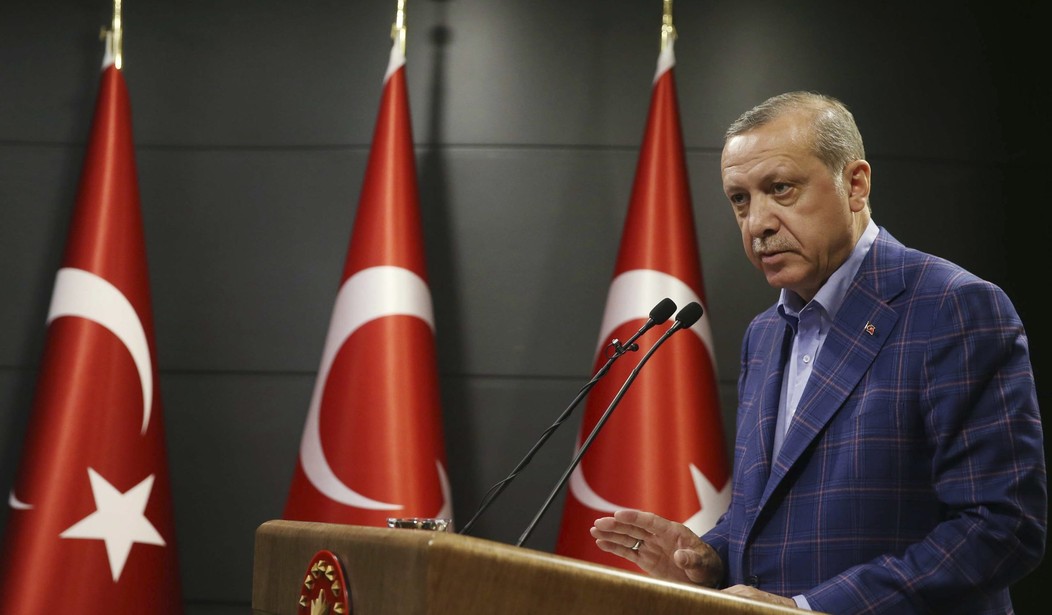The “world” — a phrase we will return to later — has seemingly become more dangerous ever since the the U.S. has stopped running from challenges, even as critics complain it turns on them without a strategy. The EU, by contrast, has kept running but is now at a dead end, penned in by a Brexit secession to the West, a new czar in Russia to the East, and by the bold claims of a new sultan to the South.
Erdogan’s claim to new dictatorial powers on the basis of a narrow and disputed referendum victory in Turkey has put him on a “collision course” with Europe, according to the Wall Street Journal:
European reaction to the vote was cautious. In a statement, European Commission President Jean-Claude Juncker and two other top officials said they had taken note of the reported results in Turkey but would await the assessment of international monitors on the vote including on “alleged irregularities.”
The vote is effectively a Turkish withdrawal from membership application in the European Union. Even Eurocrats can’t justify admitting an Erdogan under the banner of multiculturalism.
The EU is dead in the water. Everywhere one looks, whether it is the U.S. turning on its foes or the EU ignoring them, a crisis is at hand. The Turkish setbacks come after a fortnight of confrontation with Assad in Syria and Kim Jong Un in North Korea; these are more beginnings than endings. Despite Assad losing one-fifth of his air force, the civil war in Syria still rages unabated and North Korea still threatens a pre-emptive nuclear attack on America — if it can get its missiles to work.
The transformation of the old global order has clearly begun, yet in the midst of momentous developments, the New York Times has managed to entirely ignore the sea-change. The NYT warns anachronistically that London has given up its position as “capital of the world” through Brexit:
London may be the capital of the world. You can argue for New York, but London has a case. Modern London is the metropolis that globalization created. Walk the streets of Holborn, ride an escalator down to the Tube and listen to the languages in the air. Italian mingles with Hindi, or Mandarin, or Spanish, or Portuguese. Walk through the City, the financial district, and listen to the plumbing system of international capitalism. London is banker to the planet.
They have not yet noticed the universe, whose center London once occupied, has been moving away from Europe for decades. For a while it was thought to have taken up residence in California. Yet even that may prove a sometime place. Proposals by the Golden State to secede from Trumpian Washington have unearthed a desire to split up the state even further:
[T]he effort to cleave California faces a crackup of its own. At least four proposals are floating about to reshape the state in some fashion, including two that would split up California along different axes.
Perhaps the original mistake was to think of the center of the world as a geographical place instead of a culture or a state of mind, an easy error to make in 1945 when both coincided. No one — not even the Left — foresaw that “the greatest threat to the liberal international order” would come “not from Russia, China, or jihadist terror but from the self-induced deconstruction of Western culture.” As Andrew Michta perceptively put it:
The problem, rather, is the West’s growing inability to agree on how it should be defined as a civilization. At the core of the deepening dysfunction in the West is the self-induced deconstruction of Western culture and, with it, the glue that for two centuries kept Europe and the United States at the center of the international system.
It wasn’t Brexit or Trump or even Putin who unmoored the world. Gramsci did. Unmoored it so thoroughly that public debate over culture now has descended to the level of whether McDonald’s is guilty of cultural appropriation by offering Szechuan sauce with its Chicken Nuggets.
The Google which can remember Cesar Chavez has pointedly forgotten Easter.
What happens when you mislay civilization itself? Apparently, the Gramscians unexpectedly find the levers of power don’t work after they have destroyed them. But that is no surprise:
A great civilization is not conquered from without until it has destroyed itself from within.
If things seem more shapeless than they once did, it is because the spirit of civilization itself — the world as properly understood — has been cast out of its abode to wander like an exiled spirit about the world. It alighted for a while in Washington and moved on. It was sighted briefly in California. It may even now be in the Himalayan mountain passes or the stews of Shanghai. It’s not clear how far London must go to become the “capital of the world,” but in any case probably nowhere near Brussels.
Trump, Brexit, and now the Turkish authoritarianism must signal to all but the most obtuse that we’ve lost something, even though we have not yet found it. We are at the beginning of a decades-long process, not at its end. The Ides of March are come in Syria, Korea, Turkey, and Russia — but they are not yet gone.
————
Follow Wretchard on Twitter
For a list of books most frequently purchased by readers, visit my homepage.
Support the Belmont Club by purchasing from Amazon through the links below.
Books:
Shattered: Inside Hillary Clinton’s Doomed Campaign, by Jonathan Allen and Amie Parnes. How Hillary Clinton lost the 2016 election to Donald Trump is the tragic story of a sure thing gone off the rails. Using their deep access to campaign insiders, political writers Allen and Parnes reconstruct the key decisions and unseized opportunities, the well-intentioned misfires and the hidden thorns that turned a winnable contest into a devastating loss.
Portraits of Courage: A Commander in Chief’s Tribute to America’s Warriors, by George W. Bush. Growing out of President Bush’s own outreach and the ongoing work of the George W. Bush Presidential Center’s Military Service Initiative (MSI), this book brings together 66 full-color portraits and a four-panel mural painted by President Bush of America’s military veterans who have served with honor since 9/11 — and whom he has come to know personally. Net author proceeds will go to the MSI, which works to ensure that post-9/11 veterans and their families make successful transitions to civilian life.
In Search of Memory: The Emergence of a New Science of Mind, by Eric R. Kandel. How does the brain create memories? Nobel Prize winner (2000) Kandel intertwines the intellectual history of the new science of the mind — a combination of cognitive psychology, neuroscience, and molecular biology — with his own personal quest to understand memory. It brings readers from Kandel’s childhood in Nazi-occupied Vienna to the forefront of one of the great scientific endeavors of the 20th century: the search for the biological basis of memory.
Modern Prometheus: Editing the Human Genome with Crispr-Cas9, by Jim Kozubek. Would you change your genes if you could? As we confront the ‘industrial revolution of the genome’, the recent discoveries of Crispr-Cas9 technologies are offering, for the first time, cheap and effective methods for editing the human genome. Tracing events across a fifty-year period, from the first gene splicing techniques to the present day, Kozubek weaves together the fascinating stories of many of the scientists involved in the development of gene editing technology, demystifies how the technology really works and provides thought-provoking reflections on the ‘commodification’ of life.
For a list of books most frequently purchased by readers, visit my homepage.
Did you know that you can purchase some of these books and pamphlets by Richard Fernandez and share them with your friends? They will receive a link in their email and it will automatically give them access to a Kindle reader on their smartphone, computer or even as a web-readable document.
The War of the Words, Understanding the crisis of the early 21st century in terms of information corruption in the financial, security and political spheres
Rebranding Christianity, or why the truth shall make you free
The Three Conjectures, reflections on terrorism and the nuclear age
Storming the Castle, why government should get small
No Way In at Amazon Kindle. Fiction. A flight into peril, flashbacks to underground action.
Storm Over the South China Sea, how China is restarting history in the Pacific
Tip Jar or Subscribe or Unsubscribe to the Belmont Club ;










Join the conversation as a VIP Member